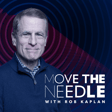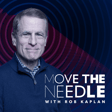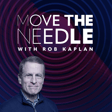
Jessica Berman
This is Move The Needle with Rob Kaplan. Where we talk to people who lead, innovate, and inspire. Today on the Move The Needle, Rob talks with Jessica Berman, commissioner of the National Women's Soccer League who has really moved the needle for women in professional sports administration, and she's someone who's had no time to ease into her job.
Jessica Berman is the Commissioner of the National Women’s Soccer League where she oversees all operations of the league with a focus on supporting players on and off the pitch, working with NWSL clubs to continue building on the positive momentum of the league’s growing audience and collaborating with NWSL partners to create the most engaging and entertaining fan experience.
Berman has received a number of distinctions throughout her career in the sports industry. Most recently, she was named Sports Business Journal’s 2022 Best Hire following her first season at the helm of the NWSL.
Berman completed her undergraduate studies at the University of Michigan in Ann Arbor, Michigan, graduating with a degree in Sports Management and Communications. A Brooklyn, New York native, Berman resides in Larchmont, New York, with her two sons and two rescue dogs.
#jessicaberman #nationalwomenssoccerleague #NWSL #womeninsports #womenssoccer #commissioner #womenssoccercommissioner #soccercommissioner #womaninbusiness #players #sportscareer #sportsbusinessjournal #umichigan #sportsmanagement #womenssoccerworldcup #soccerworldcup #soccer2024 #soccerleague #uswomenssoccer #ussf #movetheneedlewithjessicaberman #movetheneedlewithbrobkaplan #samzeff #robkaplan #scottrichardson #ronelgolden


